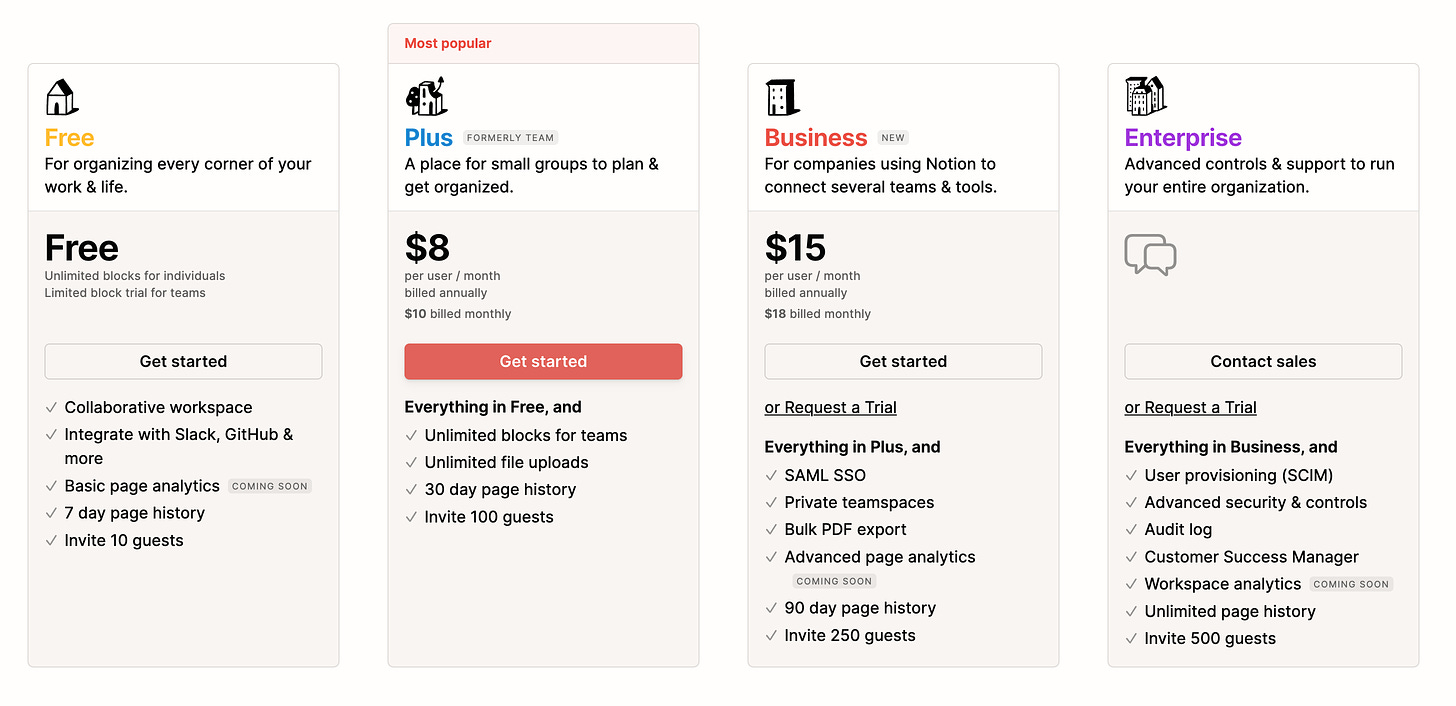SaaS Pricing is hard. PricingSaaS is your cheat code.
Monitor competitors, track real-time benchmarks, discover new strategies, and more.
1. Iterative changes are good
Notion is one of those SaaS products that provides standalone value to individual users, but can also be used at scale by B2B teams. In its early years, Notion’s platform wasn’t as sophisticated as it is now, so the company made a bigger effort to monetize individual users through a $4/mo Personal plan.
As the product has evolved, Notion has increasingly given away more functionality to those users in an effort to capture market share.
In 2020, the company made its Personal plan free and added a “Personal Pro” plan with advanced features for $4 per month.
In December’s announcement, Notion made all personal plans free, choosing to monetize exclusively with teams using the product.
I imagine Notion’s leaders knew they would eventually make personal use fully free in 2020, but taking the time to do it gradually allowed them to do two things:
Continue monetizing their most loyal individual users
Collect data from customers to inform a full B2B packaging model
Giving away personal use for free puts pressure on Notion to execute its B2B strategy, and taking time to refine that model was well worth it.
2. More plans = more leverage
Of course, there’s a natural limit where too many plans gets confusing, but in this case, Notion jumped from two B2B plans to three, adding the Business plan.
The third option allows Notion to take advantage the compromise effect, a psychological concept that suggests buyers are more likely to purchase the middle option. This format is a staple of B2B SaaS, and I saw it play out firsthand when selling Hubspot — our Professional plan was more popular than our Basic or Enterprise plan.
The addition of the business plan has three additional benefits:
At $15/mo, it’s sure to boost Notion’s ARPA (Average Revenue per Account) since the only options before were the $4/mo Personal Pro plan, the $8/mo Teams plan, or a Custom Enterprise plan.
Previously, Notion kept a lot of features tucked away in the Enterprise plan. Launching the Business plan allows them to monetize those features with customers who aren’t a fit for Enterprise.
It also gives Notion’s sales reps (yes, they have a Sales team now), leverage when working with customers to determine which package is right for them.
3. Pricing changes can be a great PR move
Of course, they can also be a disaster, but Notion gets it — in both pricing announcements, they revealed a sweeping update to their plans, laying out the rationale in clear terms.
And in both cases, the optics have been good — customers haven’t lost functionality, and have generally been able to use the product at a lower cost than before.
Notion clearly understands that when done well, a pricing refresh can be a savvy PR move that can drive new business and spark interest in their product.
Want more?
Check out my coverage of Notion’s first pricing change back in 2020 below:






